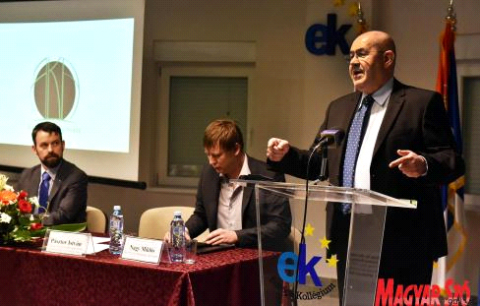
The location of the two-day-long seminar organized for young people was the Europa dormitory in Novi Sad. On Friday, the workshop which aimed at bringing the institutions of the European Union, its system of rule and political questions closer was opened, entitled How does the EU work?. The training was brought into life by the Bíró Károly Foundation of the Alliance of Vojvodina Hungarians (AVH) and the Budapest-based Robert Schumann Institute.
The Foundation started working in the summer of 2015 at the initiative of István Pásztor. As the president of the AVH said at the opening of the conference, this foundation was an inevitable task in the building up of the party.
Under the building up the party I understand the creation of institutions capable of implementing tasks emerging during the operation. The Bíró Károly Foundation has to solve such tasks. As we know, the Art Nouveau heritage of Subotica is connected to Károly Bíró’s name, who was the city’s mayor and builder for 16 years after the First World War. Because of this heritage we have decided for the Foundation to bear his name, as we can fully identify with the creation of values which are behind his name – said Pásztor.
As he said, the Foundation has to offer professional and political training to the future generations. It has to create professional workshops, in which answers can be given to the most important questions related to the topics of EU accession, autonomies, political systems or constitutional changes. Young people today have to be prepared in all these areas if they seriously consider professional success and their career.
Pásztor expressed his joy that the idea already defined at the foundation of the Europa dormitory seems to be realised: the dormitory does not guarantee only accommodation but also provides the location for trainings, a creation of a system of values and a network among young people.
The AVH is a 22-year-old party. In the past 22 years it has served the Hungarian community, but also Serbia as a whole by constantly keeping its position: for us the European direction means the only possible alternative. Luckily, by now its range of political activities has widened because Serbia has started the accession negotiations, and the AVH can have a representative in the European Parliament in Brussels much before the accession, thanks to the Fidesz–KDNP fraction. As the only Serbian party, the AVH is today member of the European People’s Party – Pásztor listed the favourable circumstances.
Elvira Kovács, member of the Executive Board of the Bíró Károly Foundation, the vice-president of the AVH called the conference an informative workshop, in which students and persons below 30 years of age who have finished higher education take part.
This is the first stop of a process thanks to which the participants can indeed thoroughly get acquainted with how the EU works. The two-day-long training in Novi Sad is followed by a three-day-long conference in Budapest at the end of May, while the most successful participants will learn about the institutions of the EU in person in July in Brussels. Because of the accession chapters that are gradually being opened, it is important that they gain as vast knowledge as possible and focus on those chapters that emphasize minority issues – said Elvira Kovács.
In his lecture about the European People’s Party, Gábor Berczeli, the director of the Robert Schumann Institute said that since the beginnings, the EPP has been the driving force of the integration and the EU enlargement; the founding fathers of the EU were also mainly from this party. Today as well this is the most defining political force in the European Parliament and in the EU’s institutions. After this lecture, Edit Auer, the Hungarian representative of the European Parliament from Slovakia spoke about the decision-making mechanisms of the EU.”

